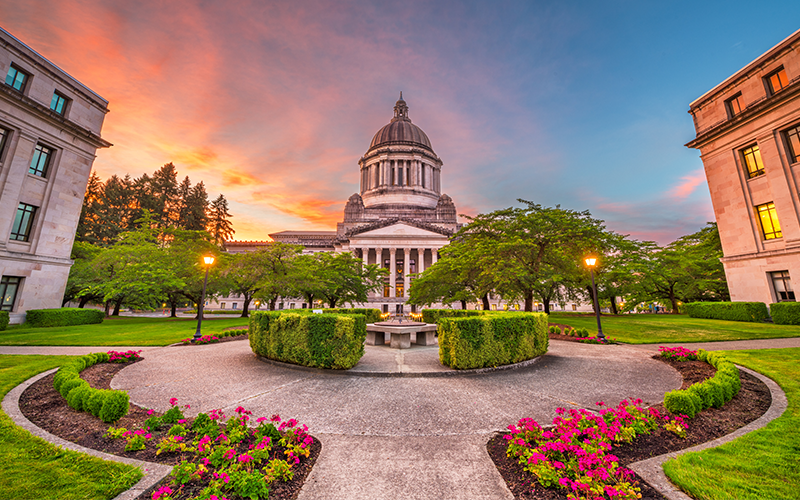As many expected, the state of Washington on March 25 bypassed the appellate court level and took its arguments directly to the state Supreme Court following Douglas County Superior Court Judge Brian Huber’s ruling earlier this month striking down Washington’s new capital gains tax.
Supporters knew the tax had constitutional problems — in addition to being wildly unpopular with the public — when it was passed by the 2021 Washington State Legislature and signed into law by Gov. Jay Inslee. But they clearly hoped the matter would eventually find its way to the reliably liberal state Supreme Court, whose justices they hoped would ignore the clear language of Washington’s constitution and 90 years of legal precedent to validate it anyway.
The Freedom Foundation, along with the Seattle law firm Lane Powell PC, was the first to file a legal challenge to the tax. That lawsuit was later joined with another filed by a coalition of farmers, business owners, investors and the Washington Farm Bureau.
Direct appeals to the Supreme Court are rarely granted but, given the sweeping nature of Huber’s rebuke, attorneys for the state obviously feared a second setback at the appeals court level could put the Supreme Court justices in an even tighter box.
Looking at it from the perspective of Washington Attorney General Bob Ferguson, however, the appeal is a win-win proposition. It costs him nothing but the taxpayers’ money if the case is thrown out yet again, and it’s the court, not him, who looks bad if the tax is reinstated.
The Washington State Constitution unequivocally bans property and income taxes that aren’t applied uniformly. Lawmakers could have circumvented that obstacle by passing a flat tax requiring everyone to pay the same rate, but the Democrat-dominated Legislature demanded a measure that punishes behavior they oppose — in this case financial success.
To get around its constitutional issues, backers of SB 5096 simply labeled their handiwork an excise tax on the privilege of selling capital assets. But Judge Huber saw through the Legislature’s shell game, writing in his 12-page opinion:
“Rather than merely relying upon whatever label or characterization the state has used to describe a tax statute, it is the state’s choices about ‘who is being taxed, what is being taxed, and how the tax is measured’ that determine its ‘incidents’ and whether it should be deemed a tax on income as opposed to an excise.”
Given that the tax imposed by SB 5096 was by nature and definition “properly characterized as an income tax,” Judge Huber concluded it:
“…violates the uniformity and limitation requirements of article VII, sections 1 and 2 of the Washington State Constitution. It violates the uniformity requirement by imposing a 7 percent tax on an individual’s long-term capital gains exceeding $250,000 but imposing zero tax on capital gains below that $250,000 threshold. It violates the limitation requirement because the 7 percent tax exceeds the 1 percent maximum annual property tax rate of 1 percent.”
Huber’s words would seem to leave little room for misinterpretation, but supporters of the tax are hoping the Supreme Court justices will legislate from the bench.
They made the same assumption two years ago, however, only to have the court in April 2020 refuse to hear the city of Seattle’s appeal regarding a similar graduated income tax ordinance, this one having previously struck down by both the King County Superior Court and the Washington State Division 1 of the Court of Appeals.
The Supreme Court commissioner, or a panel of five justices, will decide whether or not to take the AG’s direct appeal.
The Freedom Foundation will continue the fight no matter what it decides.









